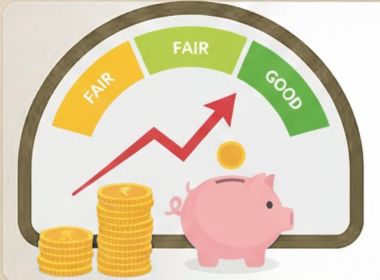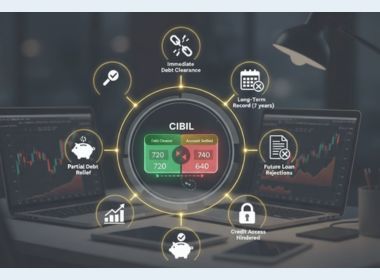Search Suggestions
- Gold Loan
- Money Transfer
- Mutual Funds

Understanding FOIR and Its Impact on Your Personal Loan Approval
Personal loans are unsecured loans with no restrictions on the end use of the money borrowed, which is why personal loans have always been a popular borrowing option for meeting financial requirements. Lenders follow stringent eligibility checks before approving an unsecured loan, like an instant personal loan, to assess the creditworthiness of a loan applicant.
Table of Content
- What Is FOIR?
- How Is FOIR Calculated?
- Impact of FOIR on Your Personal Loan Application
- How to Improve or Maintain FOIR for Personal Loan Applications?
The capacity of an applicant to repay the instant personal loan is the primary concern for lending institutions. A lack of these precautions may lead to major losses for lenders as the amounts of poor debts and non-performing assets increase. A background check of the applicant and their financial capabilities helps lenders reduce the risks associated with approving personal loan applications.
To understand the repayment capability of an applicant, lenders consider their credit score and history, income sources, monthly income, assets, liabilities, and FOIR. That is also why the list of documents required for a personal loan also includes financial proofs, like salary slips for the previous three months, bank statements, and income tax returns or Form 16.
Applying for the wrong loan amount is one of the top reasons for the rejection of personal loan applications, which is why it is a good idea to use an online personal loan eligibility calculator to get an idea of the loan amount you are eligible to borrow.
What Is FOIR?
FOIR stands for Fixed Obligation to Income Ratio, commonly known as the debt-to-income ratio. It is one of the most important factors that financial institutions use to determine the personal loaneligibility of an applicant. FOIR represents how much of an applicant’s income is earmarked for the repayment of credit obligations and existing debts. The FOIR is calculated by lenders to determine whether the applicant will be able to repay the loan. A borrower’s FOIR impacts several aspects, like the personal loan interest rate, eligibility, loan amount, etc.
How Is FOIR Calculated?
FOIR refers to the total monthly debts of an applicant, calculated as the percentage of their total monthly income. The formula for calculating FOIR is:
FOIR = (Total Monthly Financial Obligations ÷ Total Monthly Income) × 100
In the formula, total monthly obligations include EMI repayments for existing loans, credit card payments, rent payments, EMI for the loan that the applicant has applied for, and any other debt obligations that may exist. However, monthly payments and contributions towards taxes payable, fixed deposits, or recurring deposits are not considered under the total monthly obligations.
Impact of FOIR on Your Personal Loan Application
FOIR calculation plays an important role in the personal loan approval process. A low FOIR indicates that the financial obligations of an applicant are relatively lower than their monthly income, which increases the likelihood of loan approvals. On the other hand, a high FOIR represents significant debt and low disposable income. This reduces the creditworthiness of the applicant as well as the chances of loan approval.
Eligibility
Generally, financial institutions have an eligibility requirement for the FOIR being in the range of 40% to 55%. However, some lenders also accept a FOIR of up to 65% or 70% if the applicant has a high net worth.
Interest Rate
The FOIR also has an impact on the personal loan interest rate offered to borrowers. Individuals with lower FOIR can be offered more favourable rates of interest and loan terms.
Fees and Charges
Along with the interest rate offered to a borrower, FOIR also impacts the fees and charges applicable to the instant personal loan.
Loan Amount
Financial institutions can use FOIR to calculate the maximum amount that a borrower can afford to pay as EMI, which, can help determine the loan amount they are eligible for, based on the interest rate and selected loan tenure.
How to Improve or Maintain FOIR for Personal Loan Applications?
Before applying, use an online personal loan eligibility calculator to understand how much you can borrow. If it does not meet your requirements, you can work on improving your FOIR for better chances of personal loan application approvals.
Assess Existing Obligations
First, gain an understanding of your existing financial obligations. Asses your monthly EMIs, credit card payments, rent, and other fixed monthly expenses (apart from contributions for FDs, RDs, taxes, etc.).
Avoid More Debt
If it is possible, it is always a good idea to avoid or limit taking any more debt before you apply for a personal loan. This can help improve your FOIR by reducing the level of existing debt.
Choose the Right Loan Tenure
Opting for a longer tenure results in lower EMI payments. This reduces your total monthly financial obligations, resulting in a lower FOIR.
Maintain a Good Credit History
Maintaining a clear and b credit history can help improve your chances of personal loan approval. You can do this by ensuring that your credit utilisation ratio is less than 30% and making timely payments.
Refinance for Consolidate Debts
Consolidating your debts or refinancing them is a strategic move to reduce your FOIR. You can get your existing debts refinanced, which can potentially reduce your monthly financial obligations.
Consider a Co-Applicant or Guarantor
Apply for a personal loan jointly with a co-applicant or guarantor who has a b financial standing. This reduces the individual FOIR and boosts the credibility of the application.
Muthoot Finance is one of the most trusted NBFCs in India, offering a wide range of financial solutions. Here, customers can avail customised personal loan schemes with competitive interest rates and flexible repayment options.
- Instant Personal Loan
- EMI Calculator
- Document Required
- Track Personal Loan
- Interest Rate
- Procedure and Eligibility
CATEGORIES
OUR SERVICES
-

Credit Score
-

Gold Loan
-

Personal Loan
-

Cibil Score
-

Vehicle Loan
-

Small Business Loan
-

Money Transfer
-

Insurance
-

Mutual Funds
-

SME Loan
-

Corporate Loan
-

NCD
-

PAN Card
-

NPS
-

Custom Offers
-

Digital & Cashless
-

Milligram Rewards
-

Bank Mapping
-

Housing Finance
-

#Big Business Loan
-

#Gold Loan Mela
-

#Kholiye Khushiyon Ki Tijori
-

#Gold Loan At Home
-

#Sunherisoch
RECENT POSTS

Understanding KDM Gold and Why it’s Banned
Know More
Gold loan boom: 3,000 new branches to open in India in 12 months
Know More
Gold Loan Boom: Rs 14.5 lakh crore market spurs NBFCs to add 3,000 branches
Know More
How BNPL Affects Your Credit Score
Know More
Inside the Muthoot money machine: How a Kerala family turned gold loans into a billion-dollar empire
Know More
Billionaire Family Turns India’s Gold Obsession Into a Fortune
Know More
What is a Cheque and its Different Types in India?
Know More
Benefits of Paying Your EMIs on Time: Why Timely Payments Matter
Know More
A Complete Guide to Report Online Fraud
Know More
How does a Personal Loan Affect your Credit Score?
Know MoreFIN SHORTS

What Are Co-Pay and Deductibles in Insurance Policies?
Know More
Should You Take a Loan Against Your Mutual Fund or SIP?
Know More
Top 5 Best Mid-Cap Mutual Funds to Watch in 2026
Know More
Are Personal Loans Right for Retirees? Key Points to Consider
Know More
What Happens to a Personal Loan After the Borrower Dies?
Know More
Best Loan Choices for Credit Scores of 580 and Below
Know More
7 Reasons Why a Gold Loan Is the Best Option for Small Businesses
Know More
10 Reasons Why People in India Prefer Physical Gold
Know More
Real Estate vs Gold: Which Is a Better Investment in India?
Know More
10 Common Mistakes That Make Investors Lose Money in Mutual Funds
Know More
10 Reasons Why Gold Has So Much Appeal in Uncertain Times
Know More
7 Ways Settling Debt Can Impact Your CIBIL Score
Know More- South +91 99469 01212
- North 1800 313 1212


